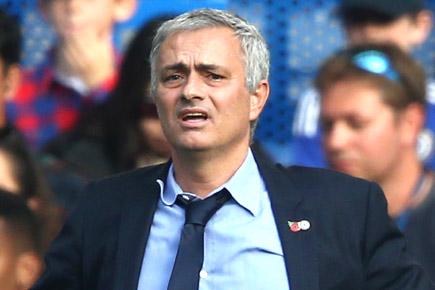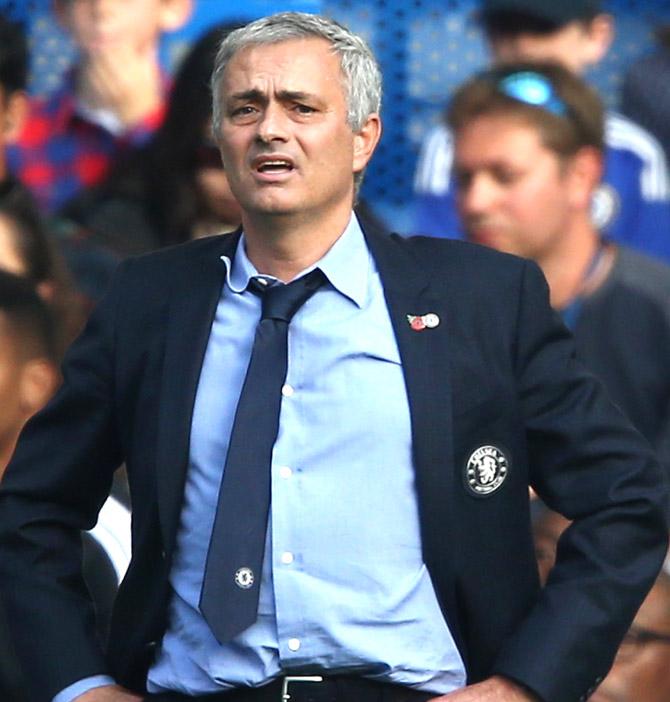For six years, spread over two stints, Jose Mourinho was that chosen one for the Stamford Bridge faithful. He was the one who delivered a first championship in half a century, with a record points tally, and who would add two more, writes Dileep Premachandran

Jose Mourinho
"Every fall into love involves the triumph of hope over self-knowledge," wrote Alain de Botton in On Love. "We fall in love hoping we won't find in another what we know is in ourselves, all the cowardice, weakness, laziness, dishonesty, compromise, and stupidity. We throw a cordon of love around the chosen one and decide that everything within it will somehow be free of our faults."
Jose Mourinho. Pic/AFP
ADVERTISEMENT
Affair with Jose
For six years, spread over two stints, Jose Mourinho was that chosen one for the Stamford Bridge faithful. He was the one who delivered a first championship in half a century (2004-05), with a record points tally, and who would add two more (2005-06 and 2014-15) while also threatening the summit of the European game.
The first 'affair' had lasted a little over three years, and the parting of ways had more to do with Roman Abramovich's desire for a more cavalier, expansive style than any failures on the pitch. This second, and surely final, divorce has come about despite the once trigger-happy Russian owner showing extraordinary patience.
Chelsea remain alive in the Champions League — they do have to face a dominant Paris St Germain in the round of 16 in February — but the defence of the Premier League title has been abject. Chances are that bookmakers wouldn't even have offered odds on last season's runaway champions losing nine of their first 16 matches.
Mourinho left a club tottering a point above the relegation zone, well adrift of even newly promoted Watford. Any analysis of what went wrong must start with the final months of the last season. Till the end of January, Chelsea were irresistible. There was a New Year's Day thumping at the hands of Tottenham, but 23 games into the season, they had scored 52 goals and conceded just 20, while accumulating 53 points.
Manchester City, who had scored 102 goals while winning the title in 2013-14, were five points and six goals behind. By the end of the season, Chelsea had stretched the advantage to eight points, but in that 15-game stretch, City outscored them 37 to 21. But with Arsenal floundering, United rebuilding and Liverpool dealing badly with heartbreak, the path to the title was still a smooth one. The warning signs were there though. When you assemble a squad with such quality, 21 goals in 15 games really isn't an acceptable return.
The key component of the 2014 summer rebuild had been Diego Costa, signed for 32 million pounds from Atletico Madrid. Costa's bruising physicality, eccentric behaviour and range of skills had all been on show a few months earlier as Atletico played Chelsea off the park in the Champions League semi-final. For a team missing a talismanic front man, he seemed an obvious acquisition.
The early signs, for the league's defenders, were terrifying, with Costa scoring seven times in his first four matches. He had managed 13 before the New Year. Then, as winter set in and his hamstrings started to play up, the goals stopped coming so easily. He finished the season with 20 in the league, and then returned from his holiday noticeably overweight.
Players off-colour
So far this season, Chelsea have scored 18 goals in 16 games. Costa's tally has been three — he has four yellow cards. Eden Hazard, Professional Footballers' Association Player of the Year last season, hasn't scored for Chelsea since May. Cesc Fabregas has been more headless chicken than midfield general. Branislav Ivanovic and John Terry have been poor.
When Mourinho spoke of 'betrayal' — a horrible choice of word — after the defeat at Leicester, you could understand where he was coming from. That Leicester rant was the final straw. A man, who once inspired such loyalty, that his players wept when he left in 2007 had been reduced to playing the blame game in public.
Now, there will be no dynasty. In so many ways, Mourinho is the modern-day Béla Guttmann, seemingly incapable of staying in a job more than three years. In a feature on Mourinho in The Blizzard, Jonathan Wilson wrote: His (Guttmann's) theory was that after two seasons a coach had said everything he had to say, that the style of play would become predictable, that players would no longer be motivated by the familiar calls to arms, that complacency and decline would inevitably set in."
It happened at Chelsea this season. The club can only hope that Mourinho didn't leave cursing. In 1962, after winning back-to-back European Cups with Benfica, Guttmann went and asked for a pay hike. When denied one, he quit, allegedly with the words: "Not in a hundred years from now will Benfica ever be European champion." They haven't won a continental trophy since.
Dileep Premachandran is Wisden India's editor-in-chief, and has also loved the Beautiful Game since he watched the Brazilians
of 1982.
He tweets @SpiceBoxofEarth Send your feedback to sports@mid-day.com
 Subscribe today by clicking the link and stay updated with the latest news!" Click here!
Subscribe today by clicking the link and stay updated with the latest news!" Click here!







